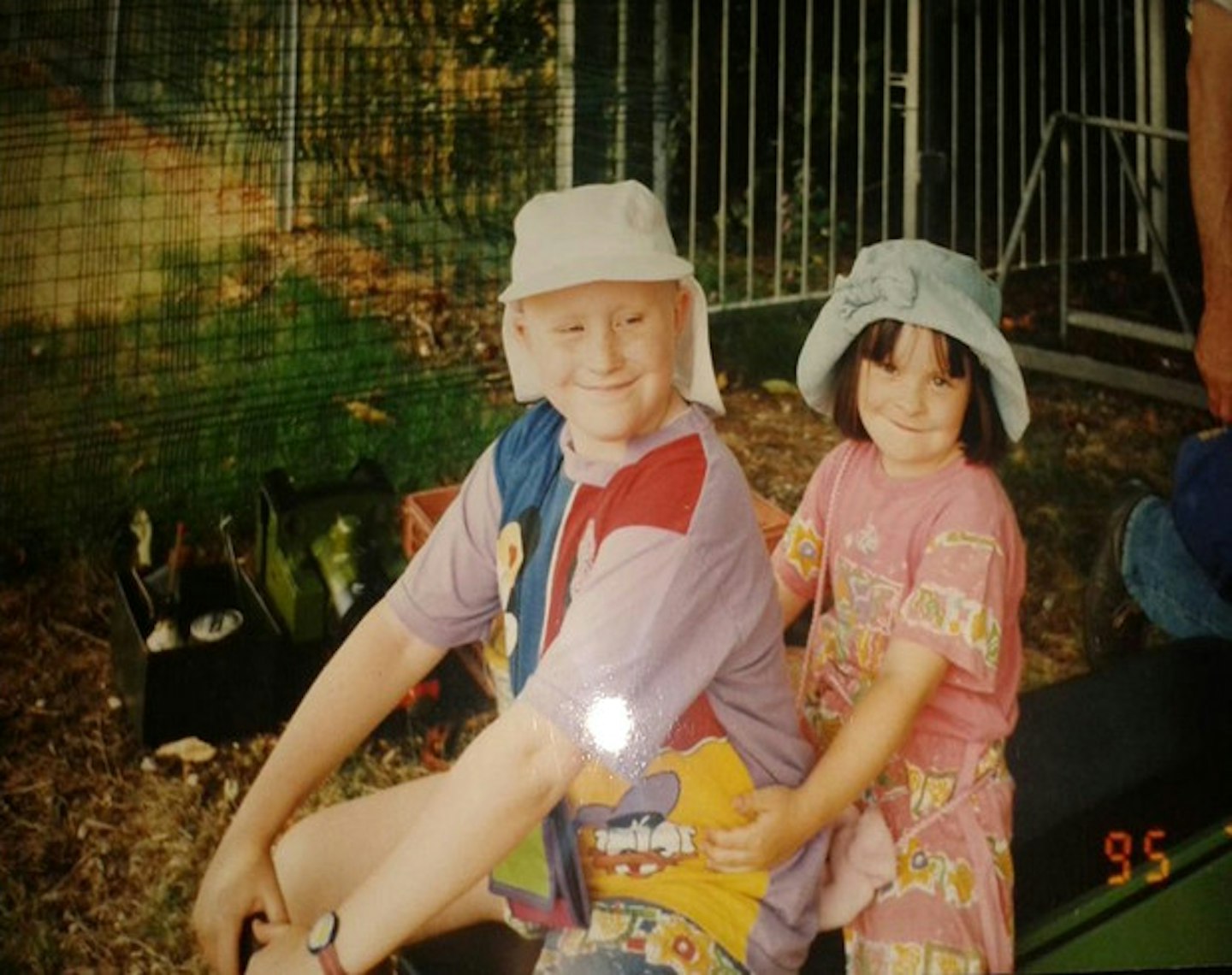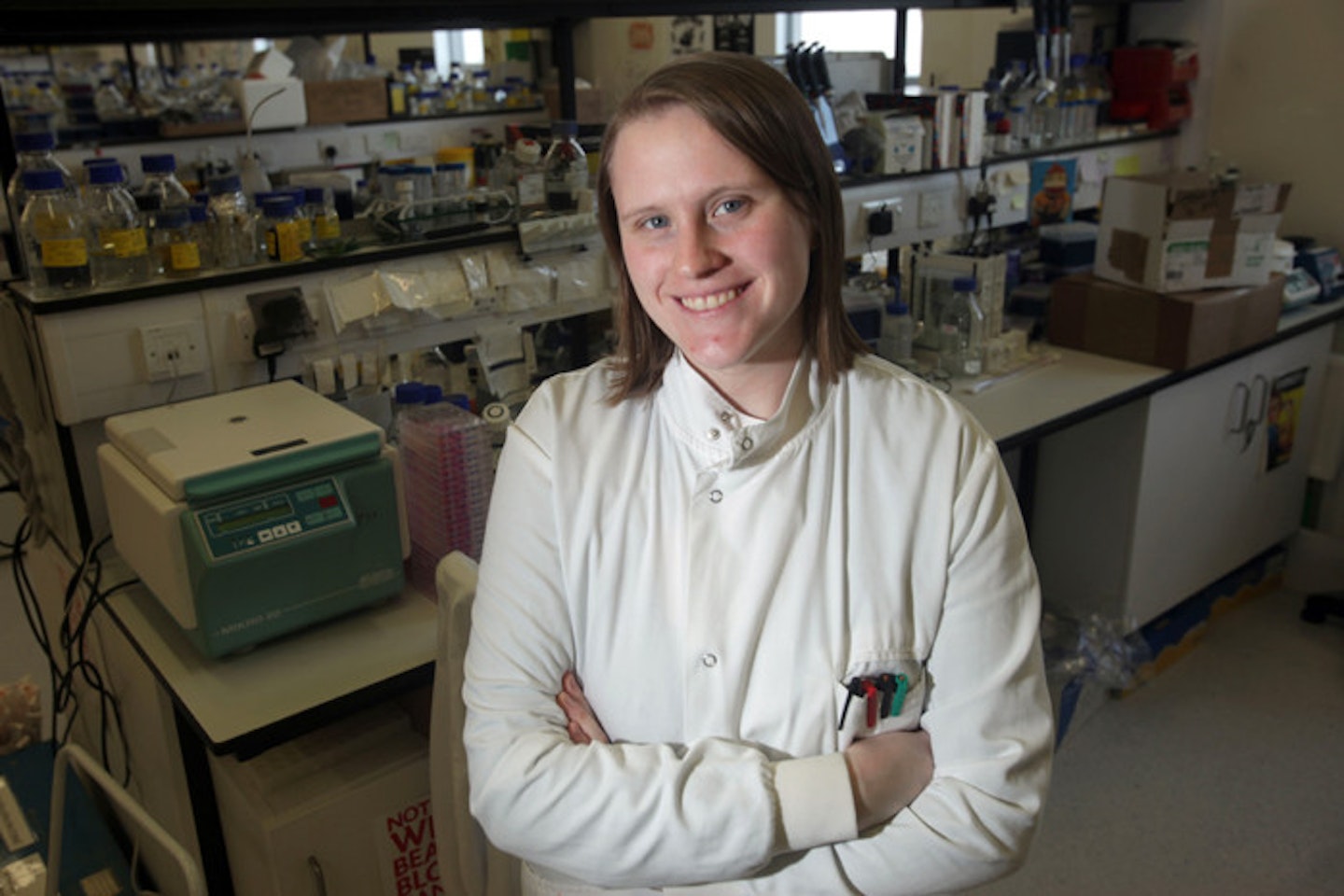As jobs go, we’d say spending your days trying to kick cancer’s ass is up there as being pretty important.
It’s what Vicky Forster does each day as a cancer research scientist, looking for new treatments to help people who are battling the disease. It’s admirable stuff – yet no one knows how vital it is more than 27-year-old Vicky herself. Because while she’s happy to spend her days fighting the disease now, 20 years ago, she had no choice in the matter.
Vicky was just seven years old when she was diagnosed with leukaemia. ‘I’d been ill for about six weeks,’ she remembers. ‘The doctors thought it was pneumonia but it wouldn’t shift so I got sent for a blood test and then very quickly diagnosed with acute lymphoblastic leukaemia and spent the next two-and-a-half years on and off in hospital in London.’

The treatment was intensive, with some harsh side effects. ‘Most seven-year-old children can’t take tablets and I certainly couldn’t, and suddenly I had to take up to 20 a day. My parents bribed me with a Gameboy,’ she remembers.
‘I also used to have one drug that they have to inject into a big muscle, and in children that’s the buttock. I didn’t look forward to those days very much. I didn’t mind losing my hair that much, though. I was the only one who got to wear baseball caps at school.’
Vicky was given a 70% survival rate (it’s now over 80% for childhood leukaemia sufferers) and after two-and-a-half years of treatment – and, she says, thanks to some incredible doctors and nurses, plus the support of her family – went back to having a relatively normal childhood. But she came full circle with her disease at university, deciding on which direction to take her career.
‘I always liked science – even before I was ill. So I did a biomedical degree and then between my second and third years I did a summer placement in a lab, sponsored by Leukaemia and Lymphoma Research. Then I applied for PhDs and got one at Newcastle Uni doing leukaemia research. It all just kind of fell into place. Cancer seemed like a logical thing for me to go into,’ she says.
Vicky believes she’s been influenced in her career decisions, to a large degree, by what she saw in hospital. ‘I was lucky, but some of my friends died while I was in hospital. There were a couple of little boys I used to read to on the ward who just didn’t come back. Seeing that does drive you to make things better.’
READ MORE: Here’s Why You Need To Stand Up To Cancer And Join March On Cancer
She finished her PhD in 2012, and found unexpected internet fame after – fuelled by a few celebratory drinks – she posted a tweet saying: ‘Dear Cancer I beat you aged eight, and today I got my PhD in cancer research. Take that.’

By the time she woke up the next day it had already been retweeted 500 times. ‘My mum rang me and said, “All these people are talking to you on Twitter. Tamsin Outhwaite from the telly is talking to you.” I was getting messages so fast I couldn’t reply. In the end, it was shared over 14,000 times, all over the world.’
Why does she think it got such a reaction? ‘I think there is a view still among a lot of people that if you have cancer you’re going to die or be disabled after it, and that it’s really going to hold you back,’ says Vicky. ‘And the tweet encapsulated that it doesn’t have to. It challenged the perspective that cancer is something you get, then you die. It challenged the perception of what people can achieve, even after going through quite harsh treatment.’
So is it her dream to cure cancer? It’s not quite that simple, she explains. ‘There is going to be no overall cure for cancer because we’re talking about 200 different diseases, but what we can do and what we are doing is finding better treatments and ones that are allowing people to survive with fewer side effects.’
There are, she says, some bizarre things about having such a personal connection to her work, though. ‘They have my blood samples at Newcastle – they arrived here about 10 years before I did,’ Vicky says. ‘They’re in the freezer in the building next to where I work. Some of my colleagues could have touched my DNA.’
And being so close to her work has brought some challenges. ‘I had to accept early on that I would find out stuff that could be important for me personally,’ she explains. ‘Essentially we’re now finding out that by the age of 45 anyone who has had childhood cancer treatment will have at least one chronic health condition, of which four out of five of those will be disabling or life threatening. But if I didn’t have the treatment as a child I probably would have died. Whatever happens to me in the future I can just tackle it as and when.’
And the best part? ‘I think that my parents always wonder if there’s something they could have done to prevent it, and now I know enough about it to tell my mum there was nothing she could have done to prevent it – it just happened.’
*Stand Up To Cancer is a joint national fundraising campaign from Cancer Research UK and Channel 4 designed to accelerate new cancer treatments to UK patients and save more lives. Stand Up To Cancer is on Channel 4 on Friday 17 October. Join the frontline against cancer this autumn: fundraise, stand up in style, March On Cancer and tune into the live TV event. Go here for more information. *
Follow Clare on Twitter @thorpers
This article originally appeared on The Debrief.
